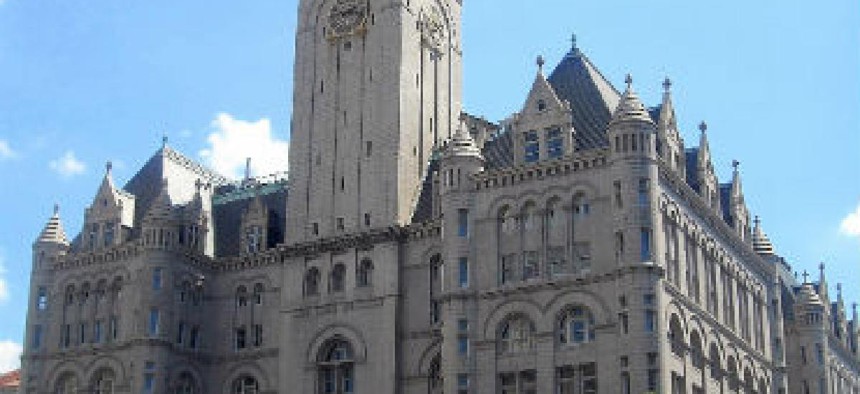GSA wants more info on Trump's D.C. hotel plans

On the heels of the president-elect's raucous Jan. 11 press conference, the General Services Administration wants more details on the future of the Trump Hotel doing business in a government building.

President-elect Donald Trump's Washington, D.C. hotel is housed in the government-owned Old Post Office building.
At a ranging and sometimes raucous Jan. 11 press conference, President-elect Donald Trump, with an assist from his legal team, gave the first description of plans for the disposition of the businessman-turned-politician's financial and property holdings.
In brief, Trump announced plans to recuse himself from the day-to-day operations of his businesses and place them in a trust to be managed by his son's Eric and Donald Jr.
Trump resisted calls from the Office of Government Ethics and others to divest his holdings. OGE memorably made its pitch for total divestment in a series of tweets on Nov. 30.
One holding may pose particular problems -- the Trump Organization's hotel in Washington, D.C.'s historic Old Post Office Building, which is owned and leased to Trump by the General Services Administration. The hotel lease specifies that the lease-holder cannot be an elected federal official.
Rep. Elijah Cummings (D-Md.), the ranking member of the House Oversight and Government Reform Committee, drew attention to the terms of the lease and the potential for conflict. In December, GSA said it was premature to release an opinion about whether the Trump Organization was in breach of the lease.
After the press conference, the agency put out a statement saying, "GSA understands that an announcement has been made to change the business structure of the Trump Organization. We are seeking additional information that explains and describes any new organizational structure as it applies to the Old Post Office lease."
The statement continued that GSA will "review this new organizational structure and determine its compliance with all the terms and conditions of the lease."
One of Trump's attorneys, Sheri Dillon of the firm Morgan Lewis, also addressed the issue of emoluments -- gifts from foreign powers that are prohibited to federal officials including the president and vice president under the U.S. Constitution. Dillon announced that profits from payments to Trump hotels from foreign governments will be donated to the U.S. Treasury.
"This way, it is the American people who will profit," Dillon said.
Walter M. Shaub, Jr., the director of the U.S. Office of Government Ethics, responded by saying that the Trump plan did not go far enough in the direction of divestment.
"Trump's current plan does not achieve anything like the clean break Rex Tillerson is making from Exxon," Shaub said at a Jan. 11 Brookings Institution event. "I don't think divestiture is too high a price to pay to be president of the United States of America."
Many prominent government ethics experts agreed with Shaub's position.
"Trump's announced structure is cleverly designed to dazzle and deceive, but it solves none of the serious ethical or legal issues," Laurence Tribe, a professor of constitutional law at Harvard said on Twitter.
Norm Eisen, the former Obama administration ethics czar, said at the Brookings event that "the president-elect has nine days to fix this problem." After he assumes office, Eisen said, Trump runs the risk of being in violation of the emoluments clause of the Constitution, among other potential problems.
This story was updated on Jan. 11 with analysis from government ethics experts.
NEXT STORY: Obama appointee to lead VA under Trump



